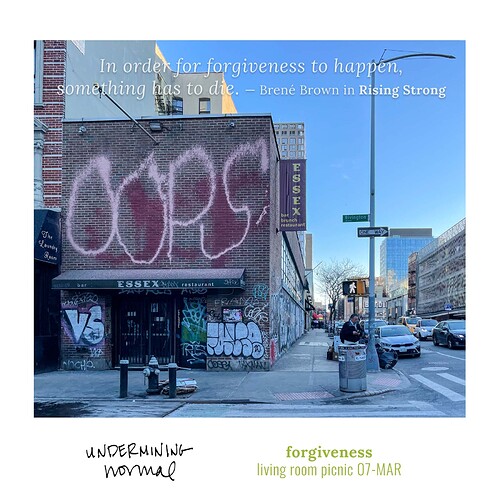in order for forgiveness to happen, something has to die
a living room picnic on Mon 07-Mar from 7:30pm-8:30pm EST
got questions? send me a note
I look forward to getting together with you ![]()
![]()
—Alex
“In order for forgiveness to happen, something has to die.” — Joe Reynolds, an Episcopal priest that Brené Brown tells us about in her book, Rising Strong: The Reckoning. The Rumble. The Revolution. (on p.150).
the invitation
Forgiveness isn’t about them, no matter what they did —it’s about you. It’s for you. generated by you, experienced by you — sometimes unfolding, roller-coastering, shrinking or expanding— and evolving in you over time: it’s not about them, it’s about you.
It may matter to them and we hope it does.
It may help them to become accountable, to change, to grow, but that’s not what you’re doing. That, is up to them.
And, it may be that you want that, want it badly, for whoever did you wrong to change, to take responsibility, to be a better [friend, partner, boss, leader, team member, neighbor, parent, sibling, child, politician, civil servant, colleague…]
But that’s not what you’re doing when you forgive. For one thing, that could happen without your forgiveness. They could see what they did and the effect it had and CHANGE regardless of whether you’ve forgiven them. And sometimes what they do to make up for what they did is never going to be enough for you to forgive them. Forgiveness is not a requirement on you. It’s an option. It’s a path.
It’s complex and complicated by the absence of conversation about what exactly it means to forgive. So that you can find your way. And I can find mine. And we can be accountable. To each other, to ourselves and to a bigger picture of who and how we want to be with each other (or without).
To forgive is not just to be altruistic. It is the best form of self-interest. It is also a process that does not exclude hatred and anger. These emotions are all part of being human. You should never hate yourself for hating others who do terrible things: the depth of your love is shown by the extent of your anger.
However, when I talk of forgiveness I mean the belief that you can come out the other side a better person. A better person than the one being consumed by anger and hatred. Remaining in that state locks you in a state of victimhood, making you almost dependent on the perpetrator.
If you can find it in yourself to forgive, then you are no longer chained to the perpetrator.
— Bishop Desmond Tutu, quoted in Rising Strong: The Reckoning. The Rumble. The Revolution. (on p.151-152.
That said, it’s a process…
something has to die
Whether it’s the expectation (or belief) that someone you care about could never or would never […]
or that you wouldn’t be capable of […]
that the relationship would always feel a certain way…
that safety or trust would mean never […] or always […]
that you could always at least count on […]
or that this relationship would never have to end,
something has to die.
And that means feeling it and grieving for it.
I never thought about that way before…that something has to die. But it makes sense to me. More importantly, it feels right to make this about what is being lost, the pain, and the grief. It’s a full-bodybeing letting go to actually forgive. And…you don’t get there in a step…everything that came before in your relationship can’t be settled with a click.
What’s your experience been? With forgiveness—giving, receiving, witnessing forgiveness…?
Let’s picnic!
what to expect
Most living room picnics mix abstract, intellectual nerdery with deeply personal storytelling (whether you share with the group or just tell yourself). There’s nothing you need to know or do beforehand to participate. Here’s how it’ll go —
- opening discussion prompt to get to know each other a little
- journaling session to gather our thoughts
- discussion to share and witness
- closing moment to feel it and savor unhurried conversation time
when: Mon 07-Mar from 7:30-8:30pm EST
to attend:
